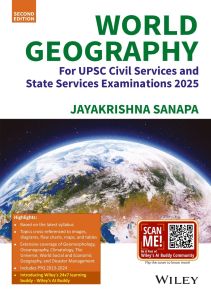World Geography: For UPSC Civil Services and State Services Examinations, 2ed
ISBN: 9789357464246
460 pages
For more information write to us at: acadmktg@wiley.com

Description
Wiley World Geography is a helpful guide to mastering World Geography, an important part of the UPSC examination. It is designed to cover key exam topics and includes Previous Years’ Questions (PYQs). The book takes a comprehensive approach, covering both the static (unchanging) and dynamic (changing) aspects of the entire World Geography UPSC syllabus. Each chapter explores a different aspect of the world, ranging from physical, economic, and socio-economic factors to disaster management. The content is organized around engaging maps, flow-charts, tables, images, and diagrams to make learning more enjoyable.
Wiley’s Introductory Feature!
Free access to AI Buddy by Wiley, your 24/7 learning companion powered by AI
Scan the QR code given on the book to start learning-on-the-go
Write prompts to get your queries resolved
Detailed analytics like Performance Tracking, Customized Learning Paths, Educator Insights, and Feedback for AI Improvement
Available via web browser and WhatsApp
Download Free PDF for World Geography
Preface
About the Author
Learning Tools
Acknowledgement
Unit I: The Universe
1 The Universe
Introduction
The Big Bang Theory
Galaxy
Life Cycle of a Star
Gravitational Waves
Origin of the Earth
Early Hypothesis
Our Solar System
Planets
The Moon
Eclipse
Kuiper Belt
Unit II: Geomorphology
2 Rocks
Introduction
What is a Rock?
Classification of Rocks
3 Earth’s Interior
Introduction
Egg Analogy
Sources—Direct and Indirect
Temperature, Pressure and Density of the Earth’s Interior
Seismic Waves
Internal Structure Based on Chemical Composition
Earth’s Interior Based on Physical Properties
4 Geomorphic Processes
Introduction
Endogenic Processes
Classification of Endogenic Process
Exogenic Processes
5 Earthquake
Introduction
Seismic Waves
Types of Earthquakes
Distribution of Earthquakes
Seismic Zones of India
Focal Depth of an Earthquake
Measuring Earthquakes
Effects of Earthquake
6 Volcanism
Volcanism
Zones of Volcanism
Classification of Volcanoes
Landforms Associated with Volcanic Activity
Distribution of Earthquakes and Volcanoes
7 Continental Drift Theory
Continental Drift Theory
Seafloor Spreading Theory
Convectional Current Theory
8 Plate Tectonics
Introduction
Tectonic Plates
Dynamic Properties of Plate Boundary
9 Orderly Formed Relief Features
Relief
Types of Landforms
Third-Order Landforms
Stages of River and Landforms
Unit III: Climatology
10 Weather and Climate
Weather and Climate
Climatology
Atmosphere
11 Insolation and Temperature
Insolation
Factors Affecting Insolation
Transfer of Heat Energy
Temperature and Factors Affecting Temperature
Temperature Zones of the World
Heat Budget of the Earth
Temperature Inversion
12 Atmospheric Pressure and Winds
Introduction
Variations in Atmospheric Pressure
Air Pressure Gradient
Seven Pressure Belts of the World
Air and Wind
Types of Winds
Atmospheric Circulations
Jet Streams
13 Humidity, Condensation and Precipitation
Introduction
Water Vapour in the Air
Condensation
Precipitation
Rainfall
Cyclone
Anti-Cyclones
Thunderstorms
Tornado
14 World Climatic Region
World Climatic Regions
Unit IV: Oceanography
15 Distribution of Water on the Continents and Oceans
Introduction
United Nations Convention on the Laws of the Sea (UNCLOS)
16 Temperature & Salinity of the Oceans
Temperature of the Oceans
Variation in Ocean Temperature
Salinity
17 Ocean Floor Relief Features
Introduction
Hypsometric or Hypsographic Curve
Relief Features of the Ocean Floor
Other Important Relief Features
18 Ocean Currents and Ocean Water Masses
Ocean Currents and Their Importance
General Pattern of Ocean Currents
Ocean Currents of the World
Atlantic Meridional Overturning Circulation (AMOC)
19 Oceanic Waves and Tides
Ocean Waves
Oceanic Tides
Types of Tides
20 Ocean Deposits and Resources
Introduction
Coral Reef
Coral Bleaching
Distribution of Coral Reefs in the World
Coral Reefs in India
Ocean Deposits
Polymetallic Nodules or Manganese Nodules
Other Resources from the Oceans
21 Critical Changes in Geographical Features
Introduction
Water Bodies
Ice Caps
Flora and Fauna
Unit V: World Social and Economic Geography
22 Distribution of Natural Resources Across the World
Natural Resource
Classification of Natural Resources
Minerals and Mineral Distribution
23 Industries
Introduction
Factors Responsible for the Location of Industries
Weber’s Theory on Industrial Locations
Footloose Industries
Sectors of Industry
Unit VI: Brief Introduction of Disaster Management
24 Disaster Management
Introduction
Types of Disasters
Disaster Management Cycle
National Agenda on Disaster Risk Reduction
National and International Initiatives for DRR
Global Platform 2022
Sustainable Development Goals with Targets Related to DRR

